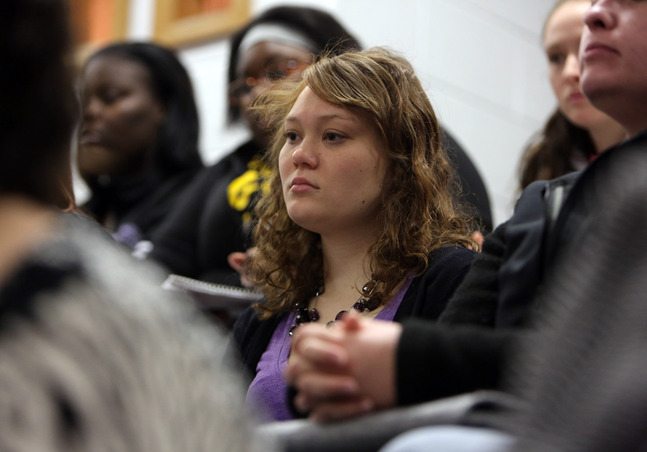By Joey Aguirre
The Hawk Eye, Burlington, Iowa.
Arabella “Belle” Babb Mansfield graduated from Iowa Wesleyan College in 1866 and became the first woman licensed to practice law in the United States.
The daylong program honored her legacy and celebrated the impact of women in business.
The entrepreneurs panel consisted of Melinda Bickel, co-owner and vice president of Bickel’s Cycling and Fitness in West Burlington, Jessica Ledger-Kalen, president and founder of Royale Concrete in Fairfield, and Michal Eynon-Lynch, co-founder of two web-based education platforms in Iowa City designed to improve learning. Denise Baker of Winegard Co., an IWC graduate, moderated.
Ledger-Kalen said in her field, made up predominantly of men, she isn’t treated or viewed any differently and doesn’t think about it a lot.
“In my industry, I really don’t think it’s an issue.
buy super kamagra generic buy super kamagra online no prescription
I want them to hire me or communicate with me or do business with me, in some way, because of my capabilities, not because I’m a woman,” Ledger-Kalen said. “I would say maybe people sometimes are surprised initially meeting me that I have the knowledge that I do, or that I can talk concrete. I’m professional, I’m damn good at what I do (operating) a company.”
Baker followed up with, “But do you feel you ever have to be better?”
“No,” Ledger-Kalen said, pointing out work is done poorly by men as well as women.
Ledger-Kalen said she doesn’t work with organizations devoted to women in her field.
“When we start having the conversation about how I’m a woman in construction, there’s a lot of these organizations that exist,” she said. “I don’t participate, because I think it’s a segregation of sexes just like we’re segregating races.”
When it comes to treatment and pay for women, Eynon-Lynch has seen changes in attitude — more people believe it’s not right for women to be treated or paid differently — but she doesn’t believe true equality has been achieved. She points to the experience of starting her own business with her husband and two other men.
“These are very supportive men, but having now worked for 14 months very closely with them, and I see the differences in the ways that we perceive certain problems, the ways we communicate about certain problems,” she said. “When you are the only female in a group of men, it’s very easy to feel shut out, or that maybe I’m a little bit crazy, because nobody is seeing it my way.”
Eynon-Lynch said when 30 percent of the group is female, the conversations tend to change.
“I don’t think my co-founders are trying to shut me out, but for things to really feel different there has to be more equity,” she said.
Bickel said it’ll be tough to span the gender gap because women are the ones having children.
“It’s very difficult balancing the working at home and the working at a career, especially in our country, where in Europe they give women a year off to have children, and here you get two days in the hospital, and in six weeks you should be back up and moving,” Bickel said. “It’s totally different approaches, and it’s a difficult thing to balance. And to put an economic dollar value to it is very hard to do.
“If you step out of your career field, and you aren’t there 40 hours a week but are home raising your children, that’s very much a commendable job,” Bickel said. “But if you aren’t working those hours, and somebody else is, of course, they are going to get the promotion and make more money.”
Progress will accelerate, Eynon-Lynch said, once more women get into decision-making roles, in business and politics, in part because the conversations will change.
“I think it’s crucial that we get more female legislators, and we have more females on corporate boards and as entrepreneurs,” she said. “Even though women have made all this progress, we’re not anywhere near parity.”
Baker said business still is largely a male domain, and she shared a story of her own in the workplace.
“I’m encouraged that the roles and stereotypes have changed,” Baker said. “In my experience as the only female in the boardroom, my first meeting I was asked to make coffee and take notes. And mind you, I’m working on my Ph.D., and I was probably the most educated person there and had a significant amount of work experience. But it was just that mindset.”














































































































































































































































































































































































